Sleep science
Inzicht in een derde van je leven
Slaap is geen passieve toestand, maar een actief en complex proces dat essentieel is voor herstel, gezondheid en mentaal evenwicht. Terwijl je slaapt, werkt je lichaam aan spierherstel, hormonale balans, geheugenverwerking en het versterken van je immuunsysteem. Toch ervaren miljoenen mensen wereldwijd slaapproblemen, vaak zonder te begrijpen waarom.
Op deze pagina duiken we in de wetenschap achter slaap. Je ontdekt:
- hoe slaapcycli en hersenactiviteit verlopen
- wat slaapstoornissen doen met je gezondheid
- welke rol je hersenen en neurotransmitters spelen
- en hoe leefstijl en gewoontes je nachtrust beïnvloeden
Onze missie? Jou helpen bewuster, dieper en beter te slapen, ondersteund door kennis, inzichten en praktische oplossingen.
Navigeer hieronder snel naar het onderwerp dat jou interesseert:
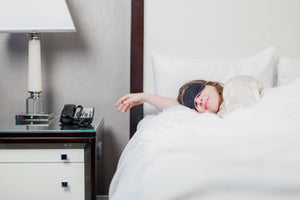
Sleep phases and cycles
Learn about the different sleep stages, brain activity patterns and cycles and how these cycles impact your sleep quality and overall well-being.
Lees meer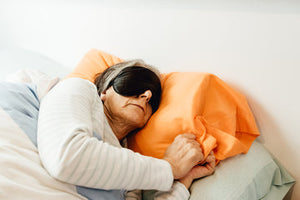
Sleep disorders and health
Delve into the world of sleep disorders and understand how these conditions can impact your overall health
Lees meer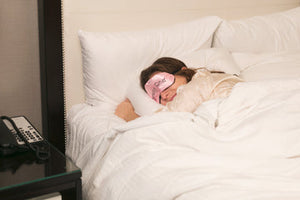
Neurological basis
Discover the fascinating neurological mechanisms underlying sleep. Learn about the role of neurotransmitters, brain regions and more.
Lees meer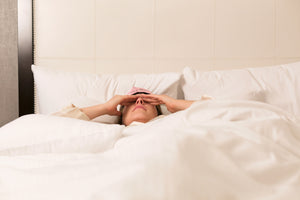
Sleep behavior and lifestyle
Discover how habits impact sleep. Learn about sleep hygiene, stress management, nutrition and exercise for well-being.
Lees meerSleep phases and cycles
Sleep consists of several stages that occur in cycles during a typical night. These stages can be divided into non-REM (NREM) sleep and REM (Rapid Eye Movement) sleep. Understanding how these stages work and what happens during each stage is essential for optimizing your sleep quality.
Non-REM Sleep: Three Stages of Recovery
Non-REM sleep is the first and most extended stage of the sleep cycle, and can be further divided into three stages :
- Stage 1: Light sleep
Stage 1, is the transitional phase between wakefulness and sleep, lasts for a few minutes and is characterized by a decrease in heart rate, breathing and eye movements. Brain waves slow down from alpha waves to theta waves.
- Stage 2: Moderate Sleep
Stage 2 is a deeper sleep than stage 1 and lasts the longest. Heart rate, breathing, and body temperature decrease further; muscles relax and eye movements stop. This stage strengthens the immune system and promotes recovery processes. Brain waves show sleep spindles and K-complexes, which maintain sleep and suppress reactions to external stimuli.
- Stage 3: Deep Sleep
Stage 3, deep or slow-wave sleep, is crucial for physical recovery and immune enhancement. Brain waves are primarily delta waves. During this stage, the body recovers, tissues are repaired, and hormones such as growth hormone are released. This stage is essential for physical recovery and energy production.
REM Sleep: The Phase of Active Brain
After the three stages of non-REM sleep comes REM sleep . This stage is unique because the brain is very active during this stage, almost comparable to the brain activity during waking hours. REM sleep is essential for cognitive functions such as memory, learning, and creativity. Most dreaming occurs during this stage. The eyes move rapidly from side to side (hence the name Rapid Eye Movement), heart rate and breathing become irregular, and muscles are temporarily paralyzed to prevent us from physically acting out our dreams.
REM sleep plays a crucial role in processing emotional experiences and consolidating memories. It is during this phase that the brain processes information gathered during the day, which contributes to learning and problem solving.
Sleep Cycles: A Repetitive Process
A complete sleep cycle , consisting of all stages of non-REM sleep followed by REM sleep, lasts about 90 to 110 minutes . During a typical night, a person goes through four to six of these cycles. The time spent in deep sleep and REM sleep varies throughout the night. Early sleep cycles have more deep sleep, while the duration of REM sleep increases in later cycles.
Understanding sleep stages and cycles is essential for better sleep quality. A regular sleep schedule and a calm sleep environment can optimize your sleep cycles and improve your health. Discover how to improve your sleep with PurelyGoods.
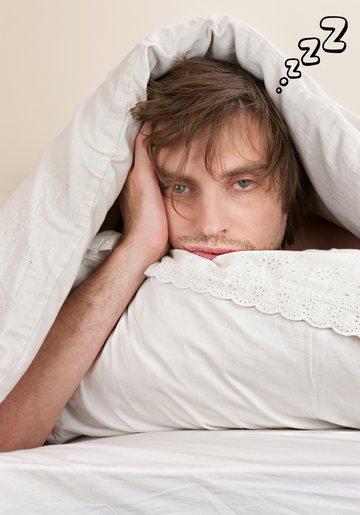
Slaapstoornissen en gezondheid
Slaapstoornissen zoals slapeloosheid, slaapapneu en restless legs-syndroom kunnen ernstige gevolgen hebben voor je algehele gezondheid. Het begrijpen van deze aandoeningen, hun symptomen, oorzaken en mogelijke behandelingen is essentieel voor het verbeteren van je slaapgezondheid en, daarmee, je algehele welzijn.
Slapeloosheid: de onmogelijkheid om te slapen
Slapeloosheid, of insomnia, is een veelvoorkomende slaapstoornis die wordt gekenmerkt door moeilijkheden om in slaap te vallen, door te slapen of te vroeg wakker te worden. Symptomen van slapeloosheid kunnen variëren van vermoeidheid overdag tot prikkelbaarheid, concentratieproblemen en verminderde prestaties op werk of school. Chronische slapeloosheid kan leiden tot ernstige gezondheidsproblemen zoals depressie, angststoornissen en een verzwakt immuunsysteem.
De oorzaken van slapeloosheid zijn divers en kunnen variëren van stress en angst tot slechte slaapgewoonten en omgevingsfactoren zoals lawaai en licht.
Slaapapneu: onderbroken ademhaling tijdens de slaap
Slaapapneu is een ernstige slaapstoornis waarbij de ademhaling herhaaldelijk stopt en start tijdens de slaap. De twee belangrijkste typen slaapapneu zijn obstructieve slaapapneu (OSA), veroorzaakt door een blokkade van de luchtwegen, en centrale slaapapneu (CSA), veroorzaakt door een miscommunicatie tussen de hersenen en de spieren die de ademhaling controleren.
Symptomen van slaapapneu omvatten luid snurken, naar lucht happen tijdens de slaap, overmatige slaperigheid overdag en ochtendhoofdpijn. Slaapapneu kan leiden tot ernstige gezondheidsproblemen zoals hoge bloeddruk, hartziekten, diabetes en beroerte.
Wist je dat neusademhaling tijdens de slaap snurken kan verminderen en diepere slaap bevordert?
Lees meer op onze pagina over Ademwetenschap.
Restless legs-syndroom: de onbedwingbare drang om te bewegen
Restless legs-syndroom (RLS) is een neurologische aandoening die wordt gekenmerkt door een onbedwingbare drang om de benen te bewegen, meestal 's avonds of 's nachts. Deze drang gaat vaak gepaard met ongemakkelijke gevoelens zoals tintelingen, jeuk of pijn in de benen.
De oorzaken van RLS zijn niet volledig begrepen, maar kunnen verband houden met genetische factoren, ijzertekort of een disfunctie in het dopaminesysteem van de hersenen. Symptomen kunnen variëren van mild tot ernstig en kunnen de slaap aanzienlijk verstoren, wat leidt tot vermoeidheid overdag en verminderde kwaliteit van leven.
Slaapwandelen: beweging tijdens diepe slaap
Slaapwandelen is een slaapstoornis waarbij iemand tijdens diepe NREM-slaap motorisch actief wordt en uit bed stapt, vaak zonder herinnering nadien. Het komt vaker voor bij kinderen, maar kan ook bij volwassenen optreden. Triggers zijn onder andere slaaptekort, stress, alcoholgebruik of koorts.
Hoewel slaapwandelen meestal onschuldig is, kan het leiden tot gevaarlijke situaties zoals vallen of het huis verlaten. Het behandelen van onderliggende slaapproblemen en het verbeteren van slaaphygiëne kan helpen om episodes te verminderen.
Impact van slaapstoornissen op de gezondheid
Slaapstoornissen hebben een grote impact op de gezondheid, waardoor het risico op hartziekten, obesitas, diabetes en mentale gezondheidsproblemen zoals depressie en angst toeneemt. Het herkennen en begrijpen van deze stoornissen is essentieel voor het verbeteren van de kwaliteit van leven. Ontdek in het volgende deel hoe neurologische processen een gezonde slaap ondersteunen en hoe PurelyGoods' oplossingen je kunnen helpen je slaap te verbeteren.
Neurologische basis van slaap
Slaap is een complexe toestand die wordt gereguleerd door verschillende neurologische mechanismen. Het centrale zenuwstelsel speelt hierin een cruciale rol, waarbij neurotransmitters zoals melatonine en adenosine signaleren wanneer het tijd is om te slapen en wakker te worden.
De suprachiasmatische kern (SCN), gelegen in de hypothalamus, fungeert als je interne klok. Deze kern is verantwoordelijk voor het reguleren van het circadiaans ritme, de 24-uurs cycli die je slaap-waakpatroon bepalen. De SCN ontvangt input van externe factoren zoals licht en temperatuur, die op hun beurt de productie van melatonine in de pijnappelklier beïnvloeden.
Neurotransmitters zijn chemische stoffen die signalen tussen neuronen in het brein overbrengen. Melatonine, vaak aangeduid als het 'slaaphormoon', wordt geproduceerd in reactie op duisternis en helpt het lichaam zich voor te bereiden op slaap. Adenosine, een andere belangrijke stof, bouwt zich gedurende de dag op in de hersenen en veroorzaakt een toenemend gevoel van slaperigheid. Tijdens de slaap daalt het niveau van adenosine weer, wat helpt bij het herstellen van de waakzaamheid.
Externe factoren kunnen deze neurologische processen aanzienlijk beïnvloeden. Licht, vooral blauw licht van schermen, kan de productie van melatonine onderdrukken, waardoor het moeilijker wordt om in slaap te vallen. Temperatuur speelt ook een rol; een koele omgeving kan de slaapkwaliteit verbeteren, terwijl een te warme omgeving slaap kan verstoren.
Het begrijpen van de neurologische basis van slaap helpt ons beter inzien hoe belangrijke factoren zoals licht, temperatuur en onze dagelijkse routines onze slaapkwaliteit beïnvloeden. Dit bewustzijn kan bijdragen aan betere slaapgewoonten en een algehele verbetering van de gezondheid.
Door de neurologische basis van slaap te bestuderen, kunnen we strategieën ontwikkelen om slaapstoornissen te verminderen en een optimale slaapgezondheid te bereiken.

Lifestyle & sleep
Your daily habits play a crucial role in the quality of your sleep. Various factors such as diet, exercise, stress management and sleep hygiene directly influence how well you sleep .
Power supply is an important component of your sleep routine. Avoiding caffeine and heavy meals before bed can help you fall asleep faster and stay asleep uninterrupted. Caffeine is a stimulant that can block the production of adenosine in the brain, helping you stay awake longer.
Exercise is another key to a good night's sleep. Regular physical activity, such as walking, jogging or yoga, can help improve the duration and depth of your sleep.
Stress management also plays a major role. High stress levels can lead to insomnia and other sleep disorders. Relaxation techniques such as meditation, breathing exercises, and progressive muscle relaxation can help quiet your mind and promote deeper, more restorative sleep.
Sleep hygiene includes all of the habits and environmental factors that support a good night’s sleep . This includes creating a quiet, dark, and cool sleep environment, as well as maintaining a consistent sleep schedule. Avoiding screen time, such as using smartphones, tablets, or computers, for at least an hour before bed can also help improve sleep quality . The blue light from these devices can disrupt melatonin production, throwing your body clock off.
Subtopics
- Nutrition and Sleep : How Food and Drink Affect Your Sleep Quality.
- Exercise and Sleep : How Physical Activity Helps You Sleep Better.
- Stress Management and Sleep : Techniques to Reduce Stress and Improve Sleep.
- Sleep Hygiene : Practical tips for an optimal sleeping environment and routine.
Understanding the relationship between sleep behavior, lifestyle, and sleep quality is essential to improving your overall well-being. By making small adjustments to your daily routine, you can significantly contribute to a deeper, more refreshing sleep. Looking for practical solutions? Discover PurelyGoods sleep solutions .
Conclusion: The Essentials of Sleep and Health
Sleep is an essential part of our lives and plays a crucial role in our overall health and well-being. By understanding the different stages and cycles of sleep, we can gain a better understanding of how our bodies and brains recover and function. Recognizing and treating sleep disorders is essential to minimizing their negative impact on health. Additionally, the central nervous system plays a vital role in regulating sleep through complex neurological processes and neurotransmitters. Our daily habits and lifestyle choices directly impact the quality of our sleep, and by making conscious adjustments, we can achieve deeper, more restorative sleep.
The goal of this text was to provide a comprehensive overview of the science of sleep, so that you can better understand what happens during your night’s sleep and how it affects your health. By presenting information about sleep stages, sleep disorders, the neurological basis of sleep, and the influence of sleep behavior and lifestyle in a logical order, I have attempted to provide a structured and detailed insight into this fascinating topic.
Improving your sleep quality starts with awareness and knowledge. By making small changes to your daily routine, such as improving your sleep hygiene, managing stress, and adjusting your diet and exercise, you can maximize the benefits of a good night’s sleep. These improvements will not only benefit your sleep, but also your overall health and quality of life.
In short, a good night's sleep is essential for both physical and mental health. By understanding the science behind sleep and taking targeted steps to optimize your sleep behavior and lifestyle, you can help lead a healthier, more energetic life.
Stay aware of your sleep habits, apply the insights you have learned, and enjoy the many benefits that a good night's sleep has to offer. Sleep well, feel good, and live better.
Wil je praktisch aan de slag met je slaap?
Deze pagina biedt je waardevolle inzichten in de wetenschap achter slaap. Wil je die kennis vertalen naar de praktijk?
👉 Ontdek dan onze uitgebreide PurelyGoods Slaapgids, een zorgvuldig samengestelde gids met bewezen routines, praktische tips en handvatten om je nachtrust te verbeteren.
Van avondroutines en ademhalingsoefeningen tot voedingsadvies en slaaphacks: alles wat je nodig hebt om beter te slapen, gebundeld in één gids.
Sleep science
Veelgestelde vragen
Hoeveel slaap heb je nodig per leeftijd?
De slaapbehoefte varieert per levensfase. Volwassenen hebben gemiddeld 7–9 uur per nacht nodig. Tieners (14–17 jaar) hebben 8–10 uur nodig, jonge kinderen nog meer (tot 12 uur). Ouderen slapen vaak lichter, maar de behoefte blijft vergelijkbaar.
Wat is het verschil tussen REM- en diepe slaap?
Diepe slaap (stadium 3 van NREM) is essentieel voor fysiek herstel en immuunfunctie. REM-slaap (Rapid Eye Movement) is belangrijk voor geheugen, emotieverwerking en dromen. In REM is je brein actief, maar je lichaam ontspannen; in diepe slaap is het omgekeerd.
Wat zijn de symptomen van slaaptekort?
Slaaptekort kan leiden tot vermoeidheid, prikkelbaarheid, concentratieproblemen, verlaagde weerstand, gewichtstoename en een hoger risico op hart- en stofwisselingsziekten. Chronisch slaaptekort verhoogt ook de kans op depressie en angst.
Waarom word ik altijd moe wakker?
Oorzaken kunnen zijn: een verstoorde slaapcyclus (wakker worden in diepe slaap), slechte slaaphygiëne, stress, slaapstoornissen (zoals apneu), of slechte ademhaling tijdens de slaap (bijv. mondademhaling).
Hoe werkt een slaapcyclus?
Een slaapcyclus bestaat uit 3 stadia NREM-slaap gevolgd door 1 REM-fase. Een volledige cyclus duurt 90–110 minuten. Je doorloopt 4–6 cycli per nacht, waarbij diepe slaap in het begin overheerst en REM-slaap later op de nacht toeneemt.
Hoe beïnvloedt slaap je hersenen?
Slaap helpt de hersenen bij geheugenopslag, het verwijderen van afvalstoffen (via het glymfatisch systeem), het herstellen van neurale verbindingen en het reguleren van emoties. Vooral REM-slaap speelt een rol in leren en creativiteit.
Wat is een circadiaans ritme?
Het circadiaans ritme is je interne 24-uursklok die je slaap-waakcyclus regelt. Het wordt gestuurd door de suprachiasmatische kern (SCN) in de hersenen en beïnvloed door licht. Verstoring kan leiden tot slaapproblemen, vermoeidheid en stemmingswisselingen.
Wat is de beste slaaphouding voor je gezondheid?
Slapen op de zij (met name de linkerzijde) wordt als het gezondst beschouwd. Het bevordert de spijsvertering, vermindert snurken en verlaagt het risico op reflux. Rugslapen is goed voor de wervelkolom maar kan snurken verergeren. Buikslapen wordt afgeraden.
Kan slecht slapen je immuunsysteem verzwakken?
Ja. Tijdens slaap worden immuuncellen geactiveerd en worden ontstekingsprocessen gereguleerd. Slaaptekort vermindert de effectiviteit van T-cellen en verhoogt ontstekingsmarkers, waardoor je vatbaarder bent voor infecties.
Wat zijn goede gewoontes voor betere slaap?
Zorg voor een vast slaapritme, een koele, donkere slaapkamer, en vermijd cafeïne, alcohol en schermgebruik in de avond. Ontspanningsoefeningen en ademhalingstechnieken kunnen helpen sneller in slaap te vallen en dieper te slapen.
Source references
Sleep apnea:
Sleep apnea is a serious condition in which breathing repeatedly stops and starts during sleep. This can lead to restless sleep, fragmented sleep, and excessive daytime sleepiness. The consequences of sleep apnea are far-reaching: increased risk of cardiovascular disease, diabetes, and even a shortened lifespan.
- “Association and Risk Factors for Obstructive Sleep Apnea and Cardiovascular Diseases: A Systematic Review (2021): https://pubmed.ncbi.nlm.nih.gov/34940026/
- "A comprehensive review of obstructive sleep apnea (2019): https://www.ncbi.nlm.nih.gov/pmc/articles/PMC8340897/
Nasal breathing:
There are many health benefits associated with breathing through your nose during sleep. The nose filters the inhaled air, warms and humidifies it, and promotes the production of nitric oxide, a molecule that has anti-inflammatory and vasodilatory properties.
- "Rediscovering the importance of nasal breathing in sleep or, shut your mouth and save your sleep" (1987): https://pubmed.ncbi.nlm.nih.gov/3298509/
- "Increased nasal breathing decreases snoring and improves oxygen saturation during sleep apnoea" (1994): https://pubmed.ncbi.nlm.nih.gov/7939149/
Mouth breathing:
Mouth breathing during sleep, also known as mouth breathing, can lead to a number of health problems. The unfiltered, cold, and dry air that enters through the mouth can irritate the throat and airways. Mouth breathing can also contribute to an increased risk of tooth decay, headaches, and even sleep disorders such as sleep apnea.
- "Mouth Breathing and Some of Its Consequences" (2016): https://pubmed.ncbi.nlm.nih.gov/29799704/
- "Mouth opening/breathing is common in sleep apnea and linked to more nocturnal water loss" (2023): https://www.ncbi.nlm.nih.gov/pmc/articles/PMC9498537/
- “The Jaw Epidemic: Recognition, Origins, Cures, and Prevention” (2020): https://academic.oup.com/bioscience/article/70/9/759/5872832
Oxygen flow:
Adequate oxygen flow during sleep is essential for good health. Insufficient oxygen supply can lead to sleep apnea, restless sleep and nighttime awakenings. The consequences of chronic sleep hypoxia, as oxygen deficiency during sleep is called, can be serious: cognitive impairment, heart problems and even death.
- "Cerebral circulation in REM sleep: is oxygen a main regulating factor?" (2018): https://pubmed.ncbi.nlm.nih.gov/11382905/
- "The effect of low flow oxygen on sleep-disordered breathing and oxygen desaturation. A study of patients with chronic obstructive lung disease" (2017): https://pubmed.ncbi.nlm.nih.gov/7428451/
Cardiovascular diseases:
Sleep deprivation and sleep disorders increase the risk of cardiovascular disease. This is because sleep plays an important role in regulating blood pressure, heart rhythm and cholesterol levels. Sleep apnea, irregular sleep times and insufficient sleep duration can lead to an increased risk of heart attacks, strokes and other cardiovascular problems.
- “Sleep Apnea and Cardiovascular Disease: A Review” (2016): https://pubmed.ncbi.nlm.nih.gov/34797460/
- “Sleep Duration and Cardiovascular Risk: A Review and Meta-Analysis” (2017): https://www.ncbi.nlm.nih.gov/pmc/articles/PMC5605360/
Mental health:
A good night’s sleep is essential for our mental health. During sleep, we process emotions, break down stress hormones and consolidate new memories. Lack of sleep can lead to anxiety, depression, mood swings, difficulty concentrating and an increased risk of mental illness.
- “Sleep and mental health in recruit paramedics: a 6-month longitudinal study” (2023): https://www.ncbi.nlm.nih.gov/pmc/articles/PMC10424174/
- “Improving sleep quality leads to better mental health: A meta-analysis of randomized controlled trials” (2018): https://www.ncbi.nlm.nih.gov/pmc/articles/PMC8651630/
Performance and endurance:
Sleep is essential for optimal performance and endurance. During sleep, muscles are repaired, energy stores are replenished, and cognitive functions are stimulated. Sleep deprivation can lead to decreased concentration, slower reaction times, decreased strength and endurance, and an increased risk of injury.
- “The Effect of Physical Activity on Sleep Quality and Sleep Disorder: A Systematic Review” (2023): https://www.ncbi.nlm.nih.gov/pmc/articles/PMC10503965/
- “Sleep and Athletic Performance: Impacts on Physical Performance, Mental Performance, Injury Risk and Recovery, and Mental Health” (2023): https://www.ncbi.nlm.nih.gov/pmc/articles/PMC9960533/
Focus and ADHD:
Sleep plays a crucial role in regulating attention and focus. Lack of sleep can lead to concentration problems, hyperactivity, impulsivity, and symptoms of ADHD. In contrast, good sleep can reduce ADHD symptoms and improve cognitive functions such as attention, planning, and problem solving.
- “Sleep deprivation: Impact on cognitive performance” (2007): https://www.ncbi.nlm.nih.gov/pmc/articles/PMC2656292/
- "Associations of sleep disturbance with ADHD: implications for treatment" (2015): https://www.ncbi.nlm.nih.gov/pmc/articles/PMC4340974/
Lucide dromen:
Lucide dromen zijn dromen waarin je je bewust bent dat je droomt. In plaats van passief een verhaal te volgen, besef je tijdens de droom wat er gebeurt – en soms kun je zelfs de controle nemen. Denk aan vliegen, praten met een droomfiguur of een nare situatie ombuigen. Deze dromen vinden meestal plaats tijdens de REM-slaap, waarin de hersenen actief zijn. Vooral de prefrontale cortex, verantwoordelijk voor zelfbewustzijn en logica, speelt hierbij een rol.
Lucide dromen zijn niet alleen fascinerend, maar kunnen ook nuttig zijn. Onderzoek suggereert dat ze kunnen helpen bij het verwerken van nachtmerries, het verminderen van angst en het stimuleren van creativiteit. Technieken zoals een droomdagboek bijhouden of reality checks overdag kunnen de kans op lucide dromen vergroten.
Let wel: overmatig proberen lucide te dromen kan je slaap verstoren. Het is belangrijk om deze ervaringen te zien als een waardevolle aanvulling, niet als vervanging van een goede nachtrust.
Bronnen:
- "The cognitive neuroscience of lucid dreaming" (2019):
https://pubmed.ncbi.nlm.nih.gov/30880167/ - "Neurobiology and clinical implications of lucid" (2013): dreaminghttps://pubmed.ncbi.nlm.nih.gov/23838126/
Relaxation:
Relaxation before bed is essential to promote a good night’s sleep. Stress, anxiety and worry can make it difficult to fall asleep and shorten sleep time. Relaxation techniques such as meditation, yoga, breathing exercises and a warm bath can calm the body and mind and prepare for sleep.
- "The effect of mindfulness meditation on sleep quality: a systematic review and meta-analysis of randomized controlled trials (2018): https://www.ncbi.nlm.nih.gov/pmc/articles/PMC6557693/
- "The role of mindfulness and relaxation in improved sleep quality following a mind-body and activity program for chronic pain" (2017): https://www.ncbi.nlm.nih.gov/pmc/articles/PMC8653783/
Stress and anxiety:
Stress and anxiety can have a major negative impact on sleep. Chronic stress and anxiety can lead to insomnia, restless sleep, nightmares and an increased risk of sleep apnea. This in turn can lead to fatigue, difficulty concentrating, irritability and a weakened immune system.
- "The impact of stress on sleep: Pathogenic sleep reactivity as a vulnerability to insomnia and circadian disorders" (2018): https://www.ncbi.nlm.nih.gov/pmc/articles/PMC7045300/
- “Sleep and anxiety disorders” (2003): https://www.ncbi.nlm.nih.gov/pmc/articles/PMC3181635/
Blood pressure:
Sleep plays an important role in regulating blood pressure. Lack of sleep and irregular sleep patterns can lead to elevated blood pressure, which is a risk factor for heart disease, stroke, and other health problems. Good sleep, on the other hand, can lower blood pressure and reduce the risk of cardiovascular disease.
- "Effects of insufficient sleep on blood pressure in hypertensive patients: a 24-h study" (1999): https://pubmed.ncbi.nlm.nih.gov/10075386/
- “Sleep and Hypertension” (2010): https://www.ncbi.nlm.nih.gov/pmc/articles/PMC2913764/
Mood and energy level:
Sleep is essential for good mood and energy levels. Lack of sleep can lead to irritability, mood swings, decreased motivation and a lack of energy. Good sleep, on the other hand, can improve mood, increase energy levels and promote a sense of well-being.
- “Relationship Between Sleep Quality and Mood: Ecological Momentary Assessment Study” (2019): https://www.ncbi.nlm.nih.gov/pmc/articles/PMC6456824/
- “The Effects of Sleep Deprivation on Mood and Energy Levels: A Meta-Analysis” (2017): https://www.ncbi.nlm.nih.gov/pmc/articles/PMC4608917/
Pain management:
Sleep plays an important role in the perception of pain. Lack of sleep can disrupt pain processing and increase pain intensity. In contrast, good sleep can promote pain relief and improve the body's ability to cope with pain.
- “Sleep and Pain: A Review” (2016): https://www.ncbi.nlm.nih.gov/pmc/articles/PMC5094755/
- "The effects of sleep loss on capacity and effort" (2014): https://www.ncbi.nlm.nih.gov/pmc/articles/PMC5605362/
REM sleep:
REM sleep, or Rapid Eye Movement sleep, is an essential phase of sleep in which dreams occur. REM sleep plays an important role in memory consolidation, emotion regulation, and creativity. Insufficient REM sleep can lead to learning disabilities, concentration problems, mood swings, and an increased risk of mental illness.
- “Physiology, Sleep Stages” (2024): https://www.ncbi.nlm.nih.gov/books/NBK526132/
- "The Biology of REM Sleep" (2018):
- https://www.ncbi.nlm.nih.gov/pmc/articles/PMC5846126/
Heart coherence (HRV):
Heart coherence, also known as heart rate variability, is a measure of the variability of the heart rate. High HRV is associated with a healthy cardiovascular system, stress resistance and good sleep. Sleep deprivation and chronic stress can lead to decreased HRV, which is a risk factor for cardiovascular disease and other health problems.
- “Evaluation of the Heart Rhythm Coherence Ratio During Sleep: A Pilot Study With Polysomnography” (2022): https://pubmed.ncbi.nlm.nih.gov/35503195/
- “The Association of Sleep Duration and Quality with Heart Rate Variability and Blood Pressure” (2017): https://www.ncbi.nlm.nih.gov/pmc/articles/PMC7680518/
Oral hygiene:
Oral hygiene is not only important for fresh breath and no dry mouth and white teeth, but also for a good night's sleep. Poor oral hygiene can lead to plaque, gingivitis and periodontitis. These conditions can cause inflammation that can disrupt sleep and lead to restless sleep, snoring and even sleep apnea.
- “Recognizing Poor Sleep Quality Factors During Oral Health Evaluations” (2019): https://www.ncbi.nlm.nih.gov/pmc/articles/PMC6546276/
- “The Relationship between Sleep, Chronotype, and Dental Caries—A Narrative Review" (2023): https://www.ncbi.nlm.nih.gov/pmc/articles/PMC10204555/
Jawline / Facial Aesthetics:
Sleep is essential for healthy, glowing skin. During sleep, skin cells are repaired, collagen is produced, and toxins are removed. Lack of sleep can lead to a dull complexion, dark circles under the eyes, fine lines, and wrinkles. Good sleep, on the other hand, can improve your complexion, increase skin elasticity, and rejuvenate your overall appearance.
- "Negative effects of restricted sleep on facial appearance and social appeal" (2017): https://www.ncbi.nlm.nih.gov/pmc/articles/PMC5451790/
- " Does poor sleep quality affect skin aging? " (2015): https://pubmed.ncbi.nlm.nih.gov/25266053/
- “The Jaw Epidemic: Recognition, Origins, Cures, and Prevention” (2020): https://academic.oup.com/bioscience/article/70/9/759/5872832
Vagus nerve:
The vagus nerve is the longest cranial nerve and plays a crucial role in regulating the autonomic nervous system, which is responsible for unconscious bodily functions such as heart rate, breathing, and digestion. The vagus nerve also activates the parasympathetic nervous system, which puts the body in a state of rest and relaxation. Lack of sleep can disrupt the activity of the vagus nerve, which can lead to stress, anxiety, digestive problems, and sleep problems.
" Effects of Vagus Nerve Stimulation on Sleep-Disordered Breathing, Daytime Sleepiness, and Sleep Quality in Patients With Drug-Resistant Epilepsy " (2022): https://www.ncbi.nlm.nih.gov/pmc/articles/PMC9163944/
Snoring:
Snoring is a common sleep disorder characterized by noisy breathing during sleep. It can lead to sleep problems, fatigue, irritability, and even health problems such as sleep apnea. Snoring is caused by vibrations of the tissues in the throat during breathing.
- " Sleep and health implications of snoring: A populational analysis " (2015): https://www.ncbi.nlm.nih.gov/pmc/articles/PMC5094759/
- "The effect of snoring and obstructive sleep apnea on the sleep quality of bed partners" (1999): https://pubmed.ncbi.nlm.nih.gov/10918859
Frequencies:
In the world of sleep, sound is more than silence. Sound waves, with their unique frequencies, influence our sleep, both positively and negatively.
Low frequency sounds (300 Hz – 1 kHz) , such as nature sounds or calming music, can reduce stress hormones and increase relaxation hormones, leading to deep, restful sleep.
High frequency noises (>2 kHz) , such as traffic or electronics, disrupt sleep cycles, causing you to wake up more often and remain in light sleep. This can lead to fatigue, irritability and difficulty concentrating.
Binaural beats , in which two tones of slightly different frequencies are played per ear, can improve sleep duration and quality, reduce stress, and even increase creativity .
- “Effect of music of specific frequency upon the sleep architecture and electroencephalographic pattern of individuals with delayed sleep latency: A daytime nap study” (2019): https://www.ncbi.nlm.nih.gov/pmc/articles/PMC6924256/
- " Effects of low frequency noise on sleep " (2004): https://pubmed.ncbi.nlm.nih.gov/15273026/
Temperature regulation:
In the wonderful world of sleep, not only sound but also temperature is essential. Our body temperature gradually drops during the evening, which is a signal for the body to fall asleep. An optimal bedroom temperature is crucial for this process and for a good night's sleep.
The cool oasis: temperature and sleep quality
When the bedroom temperature is too high, it can disrupt the natural drop in body temperature, making it harder to fall asleep and stay asleep. Sleeping too warm can lead to night sweats, restless sleep and even waking up. In contrast, a cool bedroom temperature (between 16°C and 18°C) promotes sleep duration and quality, and provides a more relaxing and refreshing sleep.
- “How Temperature Influences Sleep” (2022): https://www.ncbi.nlm.nih.gov/pmc/articles/PMC9603733/
- "The Temperature Dependence of Sleep" (2019): https://www.ncbi.nlm.nih.gov/pmc/articles/PMC6491889



